- Home
- Linda Byler
Lizzie Searches for Love Trilogy Page 2
Lizzie Searches for Love Trilogy Read online
Page 2
Still, weak with relief, she turned into her room and quietly got into bed, not wanting to wake Mandy. Maybe that’s how it was with her worrying. Everything looked so big and so terribly frightening, but if you refused to let it grow in your mind, it wasn’t half as scary as it seemed. A dog barked in the distance, and a chill crept up her spine. She flopped onto her back, seeing again the expression on Dat’s face years earlier when she had begged him not to sell Teeny and Tiny.
“Do we … I mean … do we have to, really have to sell Teeny and Tiny?” she had asked, raising her eyes in misery.
“Ach, Lizzie.” Dat’s face softened, and for a minute Lizzie knew Dat felt exactly the same way she did. Emma stopped brushing Tiny, resting her hand on his back to listen. Dat didn’t say more, and Lizzie waited expectantly, brushing back Teeny’s forelock. His hair was so soft and blond, and …
“We have to, Lizzie. We need the money, and that’s all there is to it,” Dat said gruffly.
“Oh,” said Lizzie, knowing deep down that Dat was only saying what she knew all along.
When Lizzie drove Teeny and Tiny into the ring, with Emma riding beside her, the crowd had gone wild. People stood up in their seats, clapping and cheering, smiling and waving their hats. The auctioneer could barely be heard above the thunderous applause. He laughed, put his microphone down, and waved his white cowboy hat. Emma and Lizzie had looked at each other and laughed.
Around they went, back to where Dat was standing, shaking his head and laughing, although Lizzie thought he looked as if he could cry at the same time.
“Keep going, Lizzie!” he yelled.
The auctioneer had opened the sale of the ponies at $500. He had to lower it to $300, and Lizzie dared hope that maybe, after all, Dat could not get a good price for them and they would be taken back home. Then the bidding escalated so fast and at such a confusing rate, with the auctioneer talking so fast that his words were a blur. Lizzie just kept driving the ponies steadily, eventually stopping them in front of the auctioneer’s stand.
Lizzie remembered hearing the amount of the bid. “Emma!” she whispered. “One thousand dollars!”
“That’s a lot, isn’t it?” Emma smiled at Lizzie, wringing her hands nervously in her lap.
Dat ran over to hold the ponies’ heads, patting their necks as he spoke to them.
“Eleven hundred dollars!” yelled the auctioneer. “Do I hear $1125?” A pause and a resounding, “Sold!” with a whack of his gavel, and the ponies were officially sold to buyer number 520.
Dat looked at the girls, a broad smile on his face and tears in his eyes. Lizzie and Emma smiled back, but Lizzie’s smile felt funny, as if it could slide downhill and pull tears along with it, like ice cream melting off a cone.
“Come, girls,” Dat said firmly, and they walked away, Dat in the middle with Emma and Lizzie on either side looking straight ahead. None of them had looked back at their ponies—not once. There was simply no use.
Lizzie pulled the covers up and sighed. She had done what she could to help their family have enough money then. And things weren’t as tough now as they were once. She would do what she could now to make the move to Cameron County as smooth as possible.
Chapter 2
LIZZIE HURRIED INTO THE kitchen, clutching two pieces of wood that she had collected from the back porch. She lifted the metal handle from its hook on the wall behind the kitchen range and opened the round black lid so she could feed the wood into the fire. But the fire was hot and she couldn’t quite arrange the wood so that it would fall in the way it was supposed to. She pulled back as smoke burned her eyes.
“Shut that lid!” Mam said loudly.
“I can’t get the wood in right,” Lizzie answered.
“Here.” Emma came quickly to her rescue. Lizzie stepped back as Emma removed another section of the cast-iron top, and the wood fell to the grate. She quickly replaced the top and turned to wipe her hands on her apron.
Lizzie rubbed the smoke from her eyes. What is ever going to become of us? Lizzie wondered. She dreaded the future, so afraid Mam and Dat would never be the same. Mam had never gotten this upset when they had moved in the past.
Suddenly, Emma squared her shoulders and turned to face Mam, looking directly into her eyes. “Mam, there’s not one thing that is going to keep us from moving. I wish you wouldn’t be so dead set against it. You’re just making it hard for all of us.”
Lizzie was shocked to see Mam burst into tears. She lowered her head, bringing her hands to her face and turning away. Emma watched without expression before looking at Lizzie and raising her eyebrows. Lizzie could hardly bear what was happening. She let her eyes drift out the window at the dreary landscape, the dry grass, the pallet shop, and the overcast skies.
After a moment, Mam took off her glasses and wiped her eyes with the corner of her apron. She breathed a trembling sigh, replaced her glasses, and said, “I’m sorry, Emma. I really am. I know I’m acting like an absolute baby. I have to get a hold of myself and stop this bitterness. But we have it so nice here …” Her voice trailed off.
“Mam, I know. I don’t want to move either. But we have no choice. We have to be strong and look forward now,” Emma said.
Mam sighed. “I’ve always been able to give up before this and never minded moving so much. But this time, I don’t know why, but it’s different. My whole being resists this move. I have never not wanted to do anything so badly.”
Lizzie sat down on the bench opposite Mam. She put her hands on her knees, leaned forward, her eyebrows raised hopefully. “But think, Mam, it might not be so bad. Didn’t you say we can wear a different kind of apron? A bib apron? Do you know how to make them? We could see if we have material, and you could make some for us.”
Mam looked at Lizzie, a blank expression in her eyes. “Not today.”
That was all she said, but Lizzie knew it would take Mam a while to accept this move. The weight of Mam’s struggle would fall mostly on Emma’s responsible shoulders since she was older and closer to Mam. Lizzie and Mandy would try to make everything seem normal by acting as if nothing had happened.
The next day, Lizzie and her family piled into the van Dat hired to take them to Cameron County and the farm that Dat and Doddy Glick were buying. The road into Cameron County didn’t seem very big, at least not like the four-lane highways Lizzie was used to. She leaned against the cold window of the van Dat had hired to take them to the new farm as they crossed the bridge at Port James. The road wound through the countryside, past mountains, through wooded areas, and along tumbling streams. They passed through a few small towns, but there were no cities or shopping centers—nothing big or exciting.
“Look, girls, there it is,” Dat said.
He leaned forward and pointed out the window as the driver slowed the van. Lizzie moved up in her seat so she could see where Dat was pointing. All of a sudden, there it was. The farm. Lizzie’s heart sank. She did not dare look at Mam’s face, or Dat’s, or anyone’s. It was so awful.
The barn appeared first on the left, towering over them like a dark, scary thing. There was not a drop of paint on its black weatherbeaten boards. A row of cracked, dirty windows stood along its front.
“That’s the cow stable,” Dat said.
Lizzie couldn’t understand his excitement. A rickety barbed-wire fence made a barnyard of sorts, with sagging locust posts and rusty, broken wire. The barnyard was a quagmire of trampled black mud, with broken concrete blocks, pieces of brick, and old boards scattered through the oozing sludge.
The drive turned up a small slope, and the house was on the right behind a large oak tree. The house itself was brick, with a smaller mismatched brick addition that someone had tacked on as an afterthought. A wide porch ran along the small brick addition, with three or four steps going up to it.
The thing that shocked Lizzie most was the length of the grass in the yard. It looked like a hayfield, but there was no way you could have cut it, there was so much junk in the ya
rd. The porch was filled with old stoves, chairs, boxes, barrels, chicken crates—just about anything you could imagine.
There were a few outbuildings, with broken weeds left over from the summer alongside them, hanging their heads like tired, sleepy sentries.
Despair washed over Lizzie, enveloping her in a thick cloud. Emma’s face was white, and Mandy whispered, “Wow!”
“Here we are!” Dat sang out.
“Melvin,” Mam said weakly.
“Now, Annie, I told you it looks bad. It’s just their junk, that’s all. By the time we get everything cleaned up and painted, this can be a lovely home. I tried to tell you,” he pleaded.
“But … but … Melvin, nothing could prepare me for this!” Mam gasped.
“Mam, now …” Emma said quietly.
Mam’s mouth was pressed into a thin, hard line, and Dat’s gaze never left her face as she climbed down from her seat in the van. It was heartbreaking to see how much he wanted Mam to like this farm. But it was so hopeless-looking that Lizzie pitied Mam with all her heart.
Mam stood uncertainly beside the van, her fingers working the straight pin in the front of her dress. She looked as if she could burst into tears any minute but was trying hard to put on a brave front. Dat talked to a small man in at the house for a while before motioning them all to come up on the porch.
The first thing that struck Lizzie was the bare light bulb hanging from the ceiling. It looked so stark and so ugly it reminded her of a prison. The interior of the house looked no better than the porch or the yard with dishes, clothes, boxes, shoes, and toys strewn everywhere.
The living room was an unbelievable mess. Once, when Dat had started the harness shop and things were slow, Mam had spent as much time helping him as she had working in the house. Emma had done her best to keep things clean, but sometimes things got away from her. But things at their house had never been as dirty and disheveled as this. The only thing Lizzie could really see was the television set in the corner. The sofas were sagging with pillows and afghans and two cats, a gray one and a yellow one that was so big he reminded Lizzie of a bobcat. Books teetered on the wide arm of an old brown sofa, with tablets and pencils scattered beside them. Lizzie guessed it must be someone’s homework.
Two long, narrow windows looked out over the fields to the south. The walls were papered, or had been at one time. The paper was peeling off in layers but was still intact on some of the walls. Curtains sagged at the windows, which were so dirty Lizzie could barely see the fields beyond.
Lizzie glanced at Mam to see if there was a spark of interest in her eyes. She was talking with the heavyset woman, who still had not introduced herself. Lizzie couldn’t tell how Mam felt, so she soon forgot about watching her as they finished their tour of the house.
When they had seen all the rooms, Lizzie and Mandy headed outside and toward the road, looking for bright sun and fresh air. They spotted Dat and Edwin, the small man, coming out of the cow stable. Dat looked happy, talking animatedly and pointing to the distant slopes. The two men walked along the fields to survey the property lines. Mandy and Lizzie turned back toward Mam in the house, hoping that they would soon leave.
Mam was talking to Edwin’s wife, trying to keep the twins out of mischief and looking very tired and impatient.
“Where’s Dat?” she asked as the girls entered.
Mam sighed when the girls told her he was walking along the property line with Edwin.
“Should we tell him you’re ready to go?” Lizzie asked helpfully.
“No.”
The girls sat on the porch, mostly because they didn’t know what else to do. They both felt awkward because Mam was so impatient and Dat wouldn’t be back for a while, Lizzie knew. So they sat side by side on the steps, their chins in their hands, looking out over the muddy pasture that went down to the creek.
Mandy sighed. So did Lizzie. They said nothing for a very long time.
“Mam said we’re allowed to wear sweaters here.”
“So?”
“Which would be better? Living in a nice house with our cousins and friends in Jefferson County, or living in this … this … ugly place and wearing sweaters?”
“I don’t know. Be quiet. That’s dumb.”
“You’re grouchy now.”
“Well, you don’t have to say things like that.”
They sat in silence as the birds twittered high in the old oak tree.
“We have to slap water on our hair and roll it if we live here,” Lizzie offered.
“I’m not going to.”
“You have to.”
“I don’t know how.”
“You’ll learn.”
“From who?”
“Mam.”
Lizzie felt mixed up. A part of her wanted to live here, to try new and strange things, but another part of her clung to Jefferson County. She felt as if everything secure was being taken away from her, and there was nothing to do but let it go.
Chapter 3
A FEW WEEKS LATER, Dat sold their house and the pallet business to Uncle Eli. Dat couldn’t wait to move to Cameron County. He loved change, and this was a brand new challenge, probably one of the greatest ones he ever faced.
Mam did her best to hide her misgivings. She spent lots of time at the sewing machine, making dresses and bib aprons, so different from what they wore now, for the girls. Emma giggled as Lizzie tried to put one on but got stuck. She held the strange apron in front of her, trying to figure out how she could ever get it over her shoulders.
“Here,” Mam said, throwing it over Lizzie’s head and settling it around her neck.
“Now, stick your arms through here,” she instructed.
Lizzie held her arms up, and suddenly the whole apron slid into place. She reached back to tie the strings as she hurried into the bedroom, excited to see herself in the dresser mirror.
“Lizzie’s hardly fat at all anymore,” Emma whispered to Mam.
Lizzie heard her and smiled as she turned this way and that, swiveling her head to see the back, and adjusting the front, smoothing it down over her stomach. Lizzie hated dieting. Every morning she would get up and vow silently to herself that today was the day she would start her diet.
Mam had even bought diet soda for her to drink, mostly to be encouraging without being rude. But the diet soda wasn’t very tasty all by itself. The only way Lizzie could really appreciate her diet soda was with a big, thick sandwich made of ham, cheese, lettuce, tomato, and lots of mayonnaise. And a handful of potato chips, too.
Maybe Cameron County wasn’t so bad after all, if the new aprons made her look slimmer. She studied herself in the mirror and sighed. Emma had dark hair and green eyes, with a round cherubic face which made her look a lot like Mam. Lizzie didn’t resemble Mam and Emma at all, so she guessed she must look like Dat’s side of the family. Her hair was straight and mousy brown, and her eyes were gray.
Since she had slimmed down some after becoming a teenager, her nostrils didn’t seem quite as long and slanted anymore. She supposed that when you lost weight, the size of your nostrils diminished as well, which was a very interesting thing. She never read that in a magazine though, or heard of anyone else discovering this fact, but that’s how it was for her.
And now, of all the nightmarish fears of Lizzie’s 15 years, she was getting blemishes on her forehead. Ugly red pimples that popped if you squeezed them. When the pimples had first appeared, Mam was concerned, peering closely at Lizzie’s forehead through her glasses, clucking worriedly as she did so.
“You shouldn’t squeeze them,” she would say.
Eventually Mam bought her a tube of Clearasil lotion the same color as her skin, and that helped the pimples dry up quickly. It was the single best thing anyone ever invented, Lizzie always thought, because it certainly did make a difference and it was almost like makeup.
Emma and Mandy hardly ever had one pimple, and if they did, it soon disappeared. But they were always careful of Lizzie’s feelings,
because they knew that Lizzie’s skin troubles really weren’t fair.
“Do you like it?” Mam asked from the doorway.
Lizzie smiled and glanced one more time into the mirror at her new apron. Now all Lizzie really needed to feel attractive was a nice pair of shoes with heels on them. She was not allowed to wear heels till she turned 16, but that was the one single goal of her life—to wear high-heeled shoes. She often told Emma she wanted some that would make a clacking noise when she walked. Emma said that was gros-feelich, or vain, and if that’s why she wanted high-heeled shoes, she had better forget about it.
“I love the apron,” she said. “It feels so comfortable.”
“This style will be ideal for milking cows and carrying hay bales,” Mam said.
That was closer to genuine happiness than Mam had come in a long time, Lizzie thought. She knew Mam was trying very hard to accept the move. Lizzie found that it made the future much less frightening if Mam at least tried to be a good sport about moving to the tumbledown old farm.
She turned to smile at Mam as she wriggled out of the apron, handing it back to her. “Now, when are you going to teach us how to roll our hair?” she asked since Mam was almost happy.
Mam narrowed her eyes, looking at Lizzie’s profusion of loose waves. “Go wet your hair. The whole top of your head,” she said.
“Sopping wet?” Lizzie asked.
“Well, wet.”
Lizzie giggled and ran into the bathroom. It wasn’t the wet hair that made her laugh as much as the fact that Mam was finally warming up a little bit. Kind of like an ice cube just beginning to melt. But she was melting, which made Lizzie’s heart feel light.
She pulled the pins out of her covering and laid it on the counter. She took down her bob, or hair bun, running her fingers through her waves as they tumbled down her back. Her hair was getting to be so long and thick she could hardly make a decent bob on the back of her head. She used 10 straight hairpins and still she could hardly keep her hair up till the end of the day.

 A Second Chance
A Second Chance Lizzie's Carefree Years
Lizzie's Carefree Years The More the Merrier
The More the Merrier Love in Unlikely Places
Love in Unlikely Places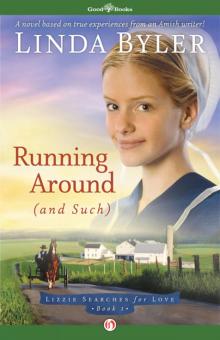 Running Around (and Such)
Running Around (and Such) Wild Horses
Wild Horses Lizzie Searches for Love Trilogy
Lizzie Searches for Love Trilogy Lizzie and Emma
Lizzie and Emma Little Amish Matchmaker
Little Amish Matchmaker The Witnesses
The Witnesses The Healing
The Healing Home Is Where the Heart Is
Home Is Where the Heart Is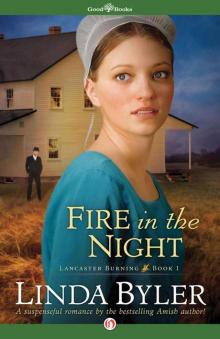 Fire in the Night
Fire in the Night When Strawberries Bloom
When Strawberries Bloom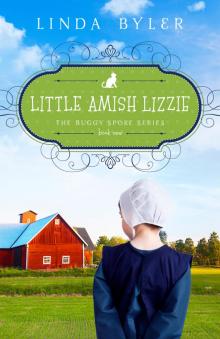 Little Amish Lizzie
Little Amish Lizzie Which Way Home?
Which Way Home? The Homestead
The Homestead Sadie’s Montana Trilogy
Sadie’s Montana Trilogy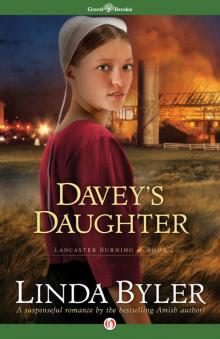 Davey's Daughter
Davey's Daughter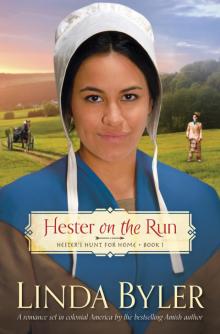 Hester on the Run
Hester on the Run Disappearances
Disappearances Big Decisions
Big Decisions Becky Meets Her Match
Becky Meets Her Match Hope on the Plains
Hope on the Plains Christmas Visitor
Christmas Visitor